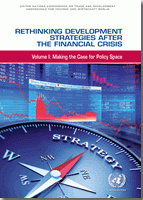
The recent economic trends and the challenges posed by the global crisis reinforce the importance of implementing strategies for development as opposed to leaving the economy to market forces.
Countries need a strategic compass for long-run economic development, either explicitly or implicitly. Among other ingredients, this comprises macroeconomic policies, sectoral policies (including the financial sector, trade and industrial policies), institution building in key areas and development-friendly global governance. Within a chosen medium- or even long-term strategy, governments need more policy space to adjust to the specific (and evolving) social, historical and institutional context.
The experience of Asia shows that rather than implementing narrow and rigid general guidelines, experimental approaches - which require policy space - are a recipe for success. Furthermore, the slow-growth periods endured by several countries (the "lost decades") allowed inferring which policies should be avoided.
The authors of this publication share the notion that developing countries can and should learn more from each other, as well as from their own past experience. It is important to look at comparisons between developing countries, including both success and failure stories.
In this first volume, the general issues that all developing countries need to handle are discussed, as well as highlighting some key policy areas of interest for most of them. Theoretical thinking on economic development largely relies on comparative analysis. In particular, it explores the reasons why some countries or regions have performed better than others in the long run.


